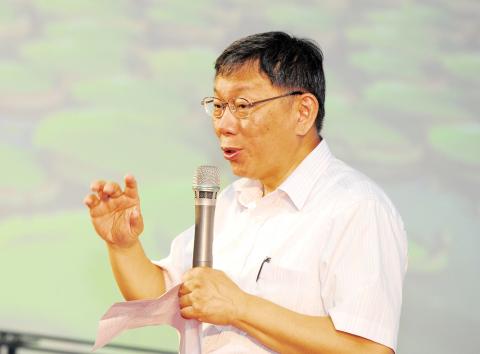Taipei Mayor Ko Wen-je (柯文哲) yesterday questioned why opinion polls are asking questions about support for him in the 2020 presidential election when he has never voiced a desire to run for the job.
After attending a handover ceremony for municipal school principals, Ko was asked by reporters about an opinion poll released on Tuesday that found nearly 40 percent of respondents supported Ko in running for presidency in 2020.
“This is interesting. I have never said I am going to run for president, so why are you asking that in the opinion poll?” Ko said.

Photo: Wang Yi-sung, Taipei Times
The poll indicated that his support rate could be higher than President Tsai Ing-wen’s (蔡英文) if he challenged her re-election bid, although 51.6 percent of respondents were against him running for president, and 54.9 percent of residents in Taipei, New Taipei City and Keelung opposed the idea.
As for the Nov. 24 elections, Ko has a significant lead (64.4 percent) in supportive rate against his Chinese Nationalist Party (KMT) and Democratic Progressive Party (DPP) rivals, Ting Shou-chung (丁守中) and Legislator Pasuya Yao (姚文智) respectively, the poll found.
Taipei residents are often least optimistic about him winning re-election when compared with the rest of the nation, but it might be because of “the beauty of distance,” he said, citing the lack of roadside parking fees outside of Taipei.
“It is interesting that the lowest support rate nationwide I get is in Taipei,” Ko said.
In his speech at the ceremony, Ko said that if he is re-elected, pushing forward with full-scale digitalization in education would be very important, as only by bridging the digital divide can students from lower socioeconomic levels have an opportunity to learn and compete with others.
Ko said he wanted to expand the scope of bilingual education in Taipei, and he pledged to continue funding for cultural exchanges to boost Taipei’s and Taiwan’s global presence by subsidizing overseas visits for students and teachers, encouraging students from other nations to visit Taipei and holding international events.

CHANGING LANDSCAPE: Many of the part-time programs for educators were no longer needed, as many teachers obtain a graduate degree before joining the workforce, experts said Taiwanese universities this year canceled 86 programs, Ministry of Education data showed, with educators attributing the closures to the nation’s low birthrate as well as shifting trends. Fifty-three of the shuttered programs were part-time postgraduate degree programs, about 62 percent of the total, the most in the past five years, the data showed. National Taiwan Normal University (NTNU) discontinued the most part-time master’s programs, at 16: chemistry, life science, earth science, physics, fine arts, music, special education, health promotion and health education, educational psychology and counseling, education, design, Chinese as a second language, library and information sciences, mechatronics engineering, history, physical education

DEADLOCK: As the commission is unable to forum a quorum to review license renewal applications, the channel operators are not at fault and can air past their license date The National Communications Commission (NCC) yesterday said that the Public Television Service (PTS) and 36 other television and radio broadcasters could continue airing, despite the commission’s inability to meet a quorum to review their license renewal applications. The licenses of PTS and the other channels are set to expire between this month and June. The National Communications Commission Organization Act (國家通訊傳播委員會組織法) stipulates that the commission must meet the mandated quorum of four to hold a valid meeting. The seven-member commission currently has only three commissioners. “We have informed the channel operators of the progress we have made in reviewing their license renewal applications, and

The High Prosecutors’ Office yesterday withdrew an appeal against the acquittal of a former bank manager 22 years after his death, marking Taiwan’s first instance of prosecutors rendering posthumous justice to a wrongfully convicted defendant. Chu Ching-en (諸慶恩) — formerly a manager at the Taipei branch of BNP Paribas — was in 1999 accused by Weng Mao-chung (翁茂鍾), then-president of Chia Her Industrial Co, of forging a request for a fixed deposit of US$10 million by I-Hwa Industrial Co, a subsidiary of Chia Her, which was used as collateral. Chu was ruled not guilty in the first trial, but was found guilty

Taiwan People’s Party (TPP) Chairman Huang Kuo-chang (黃國昌) yesterday appealed to the authorities to release former Taipei mayor Ko Wen-je (柯文哲) from pretrial detention amid conflicting reports about his health. The TPP at a news conference on Thursday said that Ko should be released to a hospital for treatment, adding that he has blood in his urine and had spells of pain and nausea followed by vomiting over the past three months. Hsieh Yen-yau (謝炎堯), a retired professor of internal medicine and Ko’s former teacher, said that Ko’s symptoms aligned with gallstones, kidney inflammation and potentially dangerous heart conditions. Ko, charged with